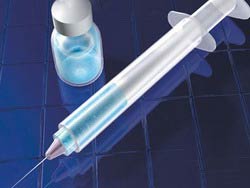New vaccine technology: more efficient and cheaper
Thanh Van
Good medical news: Biotechnology researchers in Switzerland have developed a nanoparticle that is able to deliver vaccines more efficiently, with fewer side effects and a smaller cost. with the cost of current vaccine technologies.
Described in Nature Biotechnology , the vaccine delivery platform is a simple-looking combination of nanotechnology and chemistry, a combination that shows a great benefit over current vaccine methods. This technology makes vaccination prevent diseases such as malaria and hepatitis with a single injection. With an estimated cost of about one dollar per dose, this technology is truly a breakthrough in the vaccine effort in developing countries.
Thanks to recent advances, an immune reaction can be produced only by a single protein from a virus or bacterium . Recent research also shows that the best way to get long-term immunity is to inject antigens directly into specialized immune cells such as plant cells (DCs).
This technique has not yet been put into clinical use because there are two difficulties to overcome to target DCs: First, there are not many of these cells in the skin or muscle, where injections are usually done, so It is difficult to achieve a full immune response with a single injection. Second, activating DCs requires a 'dangerous signal' of a certain type to be emitted, otherwise the immune system will ignore it. Methods to mimic bacterial molecules are known to the immune system, but this can cause side effects, even toxicity.
 (Photo: Kaiseredu.org) Professors Jeff Hubbell, Melody Swartz and Dr. Sai Reddy trainees transformed nanoparticles to completely overcome these limitations. With only 25 nanometers, the particles are so small that once injected, they flow through the extracellular body of the skin, going directly to the lymph nodes. In a few minutes, they obtained the concentration of DCs thousands of times larger than in the skin. The immune response will therefore become extremely powerful and effective.
(Photo: Kaiseredu.org) Professors Jeff Hubbell, Melody Swartz and Dr. Sai Reddy trainees transformed nanoparticles to completely overcome these limitations. With only 25 nanometers, the particles are so small that once injected, they flow through the extracellular body of the skin, going directly to the lymph nodes. In a few minutes, they obtained the concentration of DCs thousands of times larger than in the skin. The immune response will therefore become extremely powerful and effective.
In addition, the team also modified a special chemical coating for nanoparticles, which is capable of mimicking the surface chemistry of bacterial cell walls. DCs do not recognize this as a specific invader, but know well that it is something from the outside and so a low-level immune response known as the ' complement ' is created. . This results in a truly effective immune response without the risk of toxic or unpleasant side effects.
Costs and logistics are important factors, especially in use in developing countries. Unlike other nanoparticle vaccine technologies that disintegrate in water and thus require expensive drying and treatment processes, this newly modified nanoparticle only dissolves when in the body. They are liquid and do not require refrigeration and therefore the costs for preparation and handling are reduced and they are easy to transport.
The team is collaborating with the Swiss Tropical Institute in Basel to determine the strength and duration of the immune response in the environment with nanoparticle malaria vaccine. Ms. Swartz said her team is planning to use the technique to target cancer cells.
'If the vaccine technique could produce long-term immunity with a single injection of about a dollar a dose without causing toxic side effects, it could have a real effect on developed countries. More research is needed to achieve this goal, but we have a basis to believe that this technique will be put into use within the next 5 years. '
- New materials make cheap and efficient solar cells
- Tested to prove that the spray anthrax vaccine is highly effective
- New generation solar cell
- New breakthrough in solar energy technology
- New nanomaterials: The future of solar energy
- Scientists have found a way to produce lithium-ion batteries from beer
- The only injection integrates all kinds of child vaccines
- In 2020, Vietnam will produce 5 in 1 vaccine
- The United States is about to test a vaccine against HIV in humans
- Create a vaccine for meningitis
- Ebola vaccine may be completed in 2017
- Canada will donate the Ebola vaccine to WHO
 Green tea cleans teeth better than mouthwash?
Green tea cleans teeth better than mouthwash? Death kiss: This is why you should not let anyone kiss your baby's lips
Death kiss: This is why you should not let anyone kiss your baby's lips What is salmonellosis?
What is salmonellosis? Caution should be exercised when using aloe vera through eating and drinking
Caution should be exercised when using aloe vera through eating and drinking